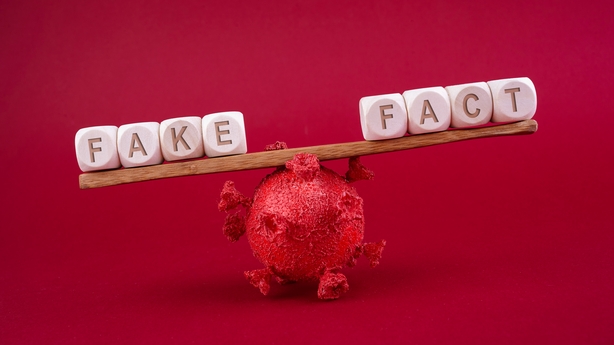Developing a working Covid-19 vaccine "might not be enough" to end the pandemic unless steps are taken to tackle coronavirus misinformation, scientists have warned.
Researchers at Cambridge University looked at survey data from 5,000 people across five countries - Ireland, the UK, the US, Mexico and Spain.
The participants were asked to rate the reliability of several statements and popular myths about Covid-19.
A "clear link" was found between conspiracy theories and hesitancy around future vaccines for the disease.
The claim that coronavirus was engineered in a lab in Wuhan, China, was deemed "reliable" by over one in four Irish people (26%) compared to just 22-23% of respondents in the UK and US.
Almost one in five people (18%) in Ireland thought the pandemic was part of a plot to enforce global vaccination. Only 13% of UK residents believed this while the theory was most popular among Mexicans (22%).
The 5G conspiracy, which claims that some telecommunication towers are worsening Covid-19 symptoms, was found to hold sway over 16% of participants in Mexico and Spain, 12% in Ireland and 8% in the UK and US.
Researchers conducted two surveys in the UK in April and May with 1,050 and 1,150 participants respectively, while there were also 700 participants each in the US, Mexico, Spain and Ireland.
Trusting politicians' ability to tackle the crisis predicted a higher likelihood of believing conspiracies in Mexico, Spain and the US, but not in the UK and Ireland, the study found.
Researchers also asked participants about their attitude to a future coronavirus vaccine.

On average, an increase by one-seventh in someone's perception that misinformation was reliable was associated with a drop of 23% in the likelihood they would agree to get vaccinated.
By contrast, a one-seventh increase in trust in scientists was associated with a 73% increase in the likelihood of getting vaccinated.
The research, published in the journal Royal Society Open Science, also found that older people and those who are good with numbers are better at spotting fake coronavirus news.
Dr Sander van der Linden, one of the authors on the study, said: "Certain misinformation claims are consistently seen as reliable by substantial sections of the public.
"We find a clear link between believing coronavirus conspiracies and hesitancy around any future vaccine.
"As well as flagging false claims, governments and technology companies should explore ways to increase digital media literacy in the population.
"Otherwise, developing a working vaccine might not be enough."
Jon Roozenbeek, the lead author and a postdoctoral fellow at Cambridge's Department of Psychology, said people were dealing with "a deluge of statistics" in the pandemic.
"The fostering of numerical skills for sifting through online information could well be vital for curbing the 'infodemic' and promoting good public health behaviour," he said.
A study from Cornell University in the US earlier this month found that President Donald Trump was the world's biggest driver of Covid-19 misinformation, because of his promotion of what researchers termed "miracle cures".
This month also saw Facebook announce a ban on accounts linked to QAnon, a conspiracy movement centred on the unsubstantiated belief that the world is run by a cabal of Satan-worshippers.

